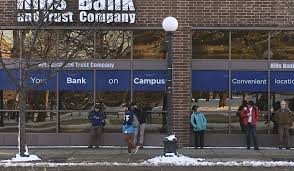 IOWA CTY, Iowa: Latinos seeking conventional home loans in the Iowa City, Iowa, area were nearly four times more likely to be denied than non-Hispanic whites in 2016, the widest disparity in the nation, a new analysis of federal data shows.
IOWA CTY, Iowa: Latinos seeking conventional home loans in the Iowa City, Iowa, area were nearly four times more likely to be denied than non-Hispanic whites in 2016, the widest disparity in the nation, a new analysis of federal data shows.
The findings suggest racial inequality in the mortgage market in the progressive college town and appear driven by a high rate of rejections for prospective Latino borrowers reported by a single financial institution, Hills Bank, according to the analysis of millions of records by Reveal from The Center for Investigative Reporting. The analysis controlled for factors such as applicants’ income, loan amount, neighborhood that could affect the likelihood of denial.
Hills Bank said its Latino denials were slightly overstated because some were mistakenly reported to the government twice. Researchers who conducted the analysis didn’t find any double-counting among Hills applicants. But even using the bank’s claimed lower denial figures, Latinos made up 3 percent of the applicants for loans in the Iowa City metropolitan area but 10 percent of the rejections during the two-year period studied.
“This is a long-standing problem and the analysis confirms what we found earlier. Hispanics are really getting hit,” said University of Iowa urban and regional planning professor Jerry Anthony, who authored a 2014 study that found Latinos faced far higher home loan denial rates in Iowa City than whites. “The bank regulators have to wake up to this and use a stick.”
Kristin Johnson, director of the Iowa Civil Rights Commission, said discriminatory lending is “definitely a concern” but the agency doesn’t have enough funding to investigate.
“This is an interesting finding that we will keep on file in the event our future fiscal situation allows us to follow up,” she said.
A spokeswoman for the Federal Deposit Insurance Corp., which regulates Hills Bank, declined comment.
Along with those in Iowa City, banks in two dozen other cities were found to consistently turn away Latino borrowers more often than whites in both 2015 and 2016, including Waco, Texas, and Little Rock, Arkansas.
The inequality was noteworthy in applications to Hills Bank, which has 18 locations in eastern Iowa and is one of the two dominant mortgage lenders in the Iowa City market. The data shows the bank received 41 percent of local Latino applications but reported issuing 68 percent of the Latino denials.
Home Mortgage Disclosure Act records show that the bank denied 15 of 91 unique loan applications from Latinos seeking conventional homes during the two-year period. That would be a 16.5 percent denial rate for Latinos, compared to 2.4 percent for whites at the bank and 0 percent for blacks.
Hills Bank CEO Dwight Seegmiller said the bank’s internal figures show 10 out of 83 Latino borrowers were denied during the two-year period and that others were double-reported by mistake. He pledged to review “reporting procedures that contributed to this difference” but defended the bank’s record, saying it has closed more loans to Latino borrowers than any other institution in the market.
“Hills Bank and Trust Company is proud of its service to a wide diversity of customers and is committed to treating all home loan applicants fairly and equitably,” he said. “We value the diversity of our customer base and look forward to continuing to expand and develop this diversity in the years to come.”
The market’s other dominant lender, University of Iowa Community Credit Union, approved the same number of loans to Latinos as Hills over the two-year period, 76, and didn’t report denying any Latino applicants.
Attorney Tom Newkirk, an expert in discrimination law, said the data suggests that implicit biases could be leading to some rejections for Latino borrowers at Hills Bank and approvals for whites who are similarly situated. He said the denials could suggest a backlash to the growing Latino population in the metropolitan area of 170,000.
“This could be resentment, perceptions of where people are supposed to live and biases about the perception of Latinos’ financial stability,” he said. “The bank needs to take responsibility and make changes to figure out where this problem is coming from.” -AP






